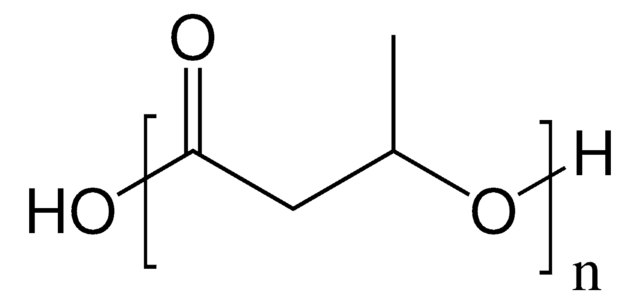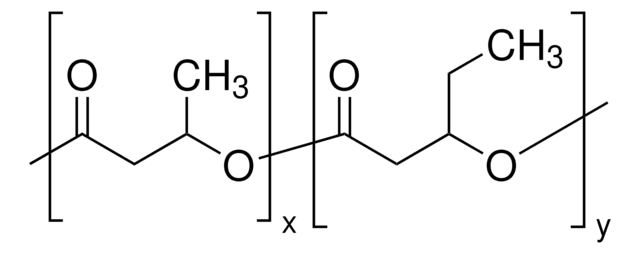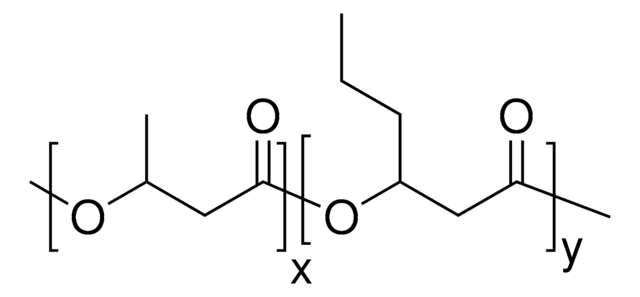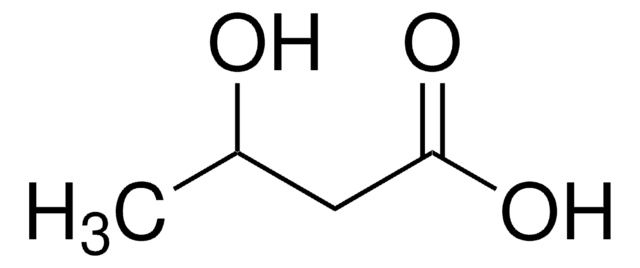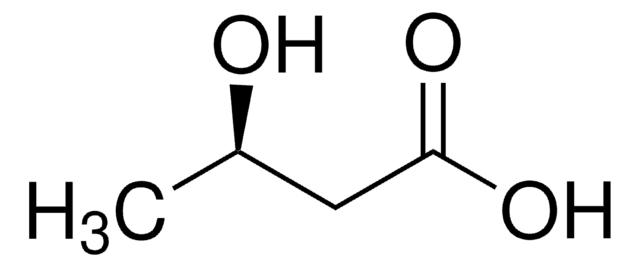363502
Poly[(R)-3-hydroxybutyric acid]
natural origin
Synonym(s):
(R)-3-Hydroxybutyric acid polymerized, PHB
Sign Into View Organizational & Contract Pricing
All Photos(1)
About This Item
Linear Formula:
[COCH2CH(CH3)O]n
CAS Number:
MDL number:
UNSPSC Code:
12162002
PubChem Substance ID:
NACRES:
NA.23
Recommended Products
transition temp
Tm 172 °C (DSC)
SMILES string
CC(O)CC(O)=O
InChI
1S/C12H20O6/c1-8(14)6-11(15)18-10(3)7-12(16)17-9(2)4-5-13/h5,8-10,14H,4,6-7H2,1-3H3
InChI key
QLACRIKFZRFWRU-UHFFFAOYSA-N
Looking for similar products? Visit Product Comparison Guide
Related Categories
General description
Biocompatible, biodegradable polymer.
Application
Poly[(R)-3-hydroxybutyric acid (PHB) is a biodegradable and biocompatible polymer produced by several bacterial species, owing to its low resorbability and tunable properties, it may find uses in a variety of applications such as tissue engineering, controlled release systems etc.
Storage Class Code
11 - Combustible Solids
WGK
WGK 3
Flash Point(F)
Not applicable
Flash Point(C)
Not applicable
Choose from one of the most recent versions:
Already Own This Product?
Find documentation for the products that you have recently purchased in the Document Library.
Proliferation and skeletal myotube formation capability of C2C12 and H9c2 cells on isotropic and anisotropic electrospun nanofibrous PHB scaffolds.
Ricotti L, et al.
Biomedical Materials (Bristol, England), 7(3), 035010-035010 (2012)
Engineering of Saccharomyces cerevisiae for the production of poly-3-d-hydroxybutyrate from xylose.
Sandstrom A G, et al.
AMB Express, 5(1), 14-14 (2015)
Molecular mass of poly [(R)-3-hydroxybutyric acid] produced in a recombinant Escherichia coli.
Kusaka S, et al.
Applied Microbiology and Biotechnology, 47(2), 140-143 (1997)
Rosetta N Reusch
Chemistry & biodiversity, 9(11), 2343-2366 (2012-11-20)
Poly-(R)-3-hydroxybutyrates (PHB), linear polymers of (R)-3-hydroxybutyrate, are components of all biological cells in which short polymers (<200 monomer residues) are covalently attached to certain proteins and/or noncovalently associated with polyphosphates - inorganic polyphosphate (polyP), RNA, and DNA. The low concentrations
Asli S Ciggin et al.
Bioresource technology, 129, 118-126 (2012-12-13)
The aerobic metabolism of a mixture of acetate and starch was studied with main emphasis on their interaction and the effect on their storage as PHB and glycogen, respectively. Pulse feeding strongly increased the storage of both substrates; however, the
Our team of scientists has experience in all areas of research including Life Science, Material Science, Chemical Synthesis, Chromatography, Analytical and many others.
Contact Technical Service